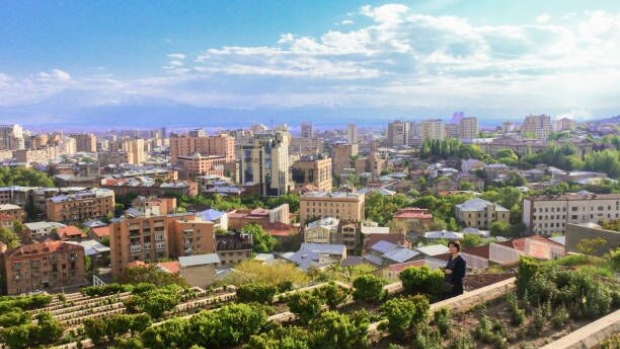Jul 2, 2024
Azerbaijan Escalates Conflict With France in Pacific Over Armenia Arms Supply
, Bloomberg News

(Bloomberg) -- Azerbaijan is escalating a conflict with France that’s playing out in French territories in the Pacific, Caribbean and Latin America over weapons the European nation has supplied to Armenia.
The Baku Initiative Group, an organization linked to the Azerbaijani government, is agitating for an end to Paris’s rule in many of its overseas regions, supporting pro-independence activists in places like French Polynesia and New Caledonia.
“Today, the whole world sees what the French state is up to in these colonized territories,” the group’s head, Abbas Abbasov, said in an interview.
The confrontation looks set to worsen as France, home to the world’s third largest Armenian diaspora, just signed a fresh arms deal with Yerevan. Paris is expected to maintain military backing for Armenia no matter the outcome of snap legislative elections called by President Emmanuel Macron.
To be sure, Azerbaijan has spent billions of dollars on arms supplies itself, also provided by foreign powers such as Turkey, Israel and Russia. That has helped it wage two wars since 2020 against Armenia-backed separatists.
Azerbaijan in a lightening offensive last September gained full control of the disputed region of Nagorno-Karabakh, causing the 100,000 Armenian residents to flee. That followed a 2020 war in which Azerbaijan took part of the territory and regained control of seven surrounding districts that had been occupied by Armenian forces for more than a quarter of a century.
The two countries are attempting to reach a peace agreement to end the decades-long conflict and are working to delineate their common border.
“Azerbaijan is incensed by Armenia’s receipt of armaments from France and has responded vehemently,” said Zaur Shiriyev, a non-resident scholar at the Carnegie Russia Eurasia Center.
The friction is playing out alongside problems implementing a July 2022 deal with the European Union to double gas imports from Azerbaijan, because of a reluctance among countries in the bloc to finance the expansion of pipeline capacity and endorse long-term contracts.
“Unfortunately, it is a fact that France is the main initiator of anti-Azerbaijan efforts,” said Azerbaijani Foreign Ministry spokesman Aykhan Hajizada when asked if France was supportive of the 2022 agreement.
There is broad opposition within the EU to the deal amid a push away from fossil fuels and human rights concerns, said Phuc Vinh Nguyen from the Paris-based Jacques Delors Institute. In April, the European Parliament adopted a resolution that called on the bloc to consider suspending the energy partnership over political prisoners in Azerbaijan.
“There’s a geopolitical dimension,” he said, pointing to Azerbaijan’s use of force in Nagorno-Karabakh, as well as Azerbaijani President Ilham Aliyev’s family dynasty and much-criticized record on human rights. “You can’t close your eyes to what is happening there.”
The dispute between Baku and Paris reached its worst point yet in the archipelago of New Caledonia, where Macron called off controversial voting reforms last month after deadly pro-independence unrest.
Weeks of protests, arson and looting erupted in the region in May when France approved the reforms that the indigenous Kanak people feared would dilute their rights. With some protesters brandishing Azeri flags, France accused Azerbaijan of fanning the flames.
Macron, who traveled 17,000 kilometers (11,000 miles) to the territory in a failed bid to calm the crisis, suspended the legislation on June 12. Since then, French authorities have stepped up a crackdown in New Caledonia, detaining seven pro-independence activists and flying them to face charges in France.
Azerbaijan’s actions are clearly negative for France, said an official familiar with French thinking. The Azerbaijanis are trying to get France to drop or decrease support for Armenia, said the official, who spoke on condition of anonymity because of the sensitivity of the issue.
Baku’s reaction to the weapons sales “causes confusion,” Armenia’s Foreign Ministry said in a June 19 statement. “It is the sovereign right of every state to maintain combat-capable armed forces equipped with modern military assets,” the ministry said, adding it doesn’t have “ambitions beyond its internationally recognized” territory.
Since September, the Baku Initiative Group has staged a dozen international events in support of anti-colonialism, including in late June at the United Nations in New York after visits to Baku by delegations from New Caledonia and French Polynesia.
While Abbasov says his group receives no government financing and is not connected to the dispute between Azerbaijan and France, Aliyev in January publicly endorsed its work.
“We will help to expose French neo-colonialism and contribute to the process of liberation of French colonies from the colonial yoke,” Aliyev said.
The group says it’s also working with French Guiana, Martinique, Guadeloupe, Wallis and Futuna and Corsica.
In another sign of worsening ties, Azerbaijan in December expelled two French diplomats, sparking a tit-for-tat response. It also detained a businessman from France on charges of spying and ordered the closing of the French school in Baku.
France sees Azerbaijan’s behavior as “extremely unfriendly and aggressive,” said Dorothee Schmid, an expert at the French Institute of International Relations in Paris. Still, it will continue arming Armenia, she said.
In the latest weapons deal, French Defense Minister Sebastien Lecornu said June 18 that France will sell self-propelled howitzers to Armenia. France has already pledged to supply radars, air-defense systems and armored personnel carriers.
--With assistance from Samy Adghirni and Zulfugar Agayev.
©2024 Bloomberg L.P.

